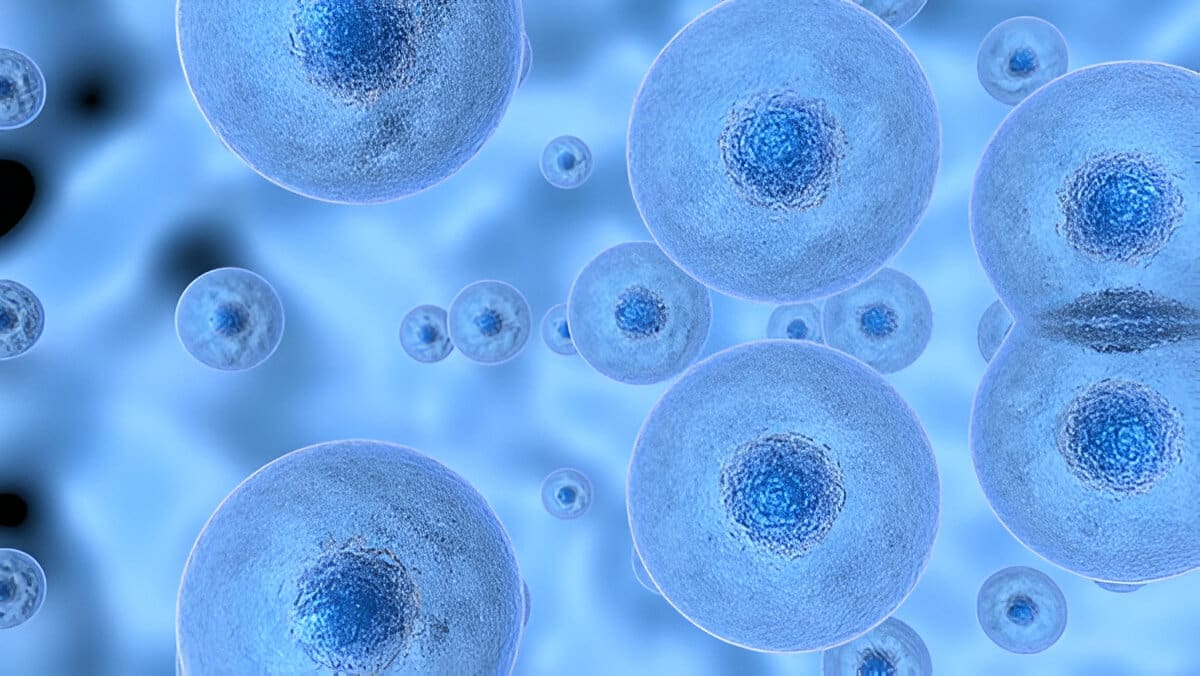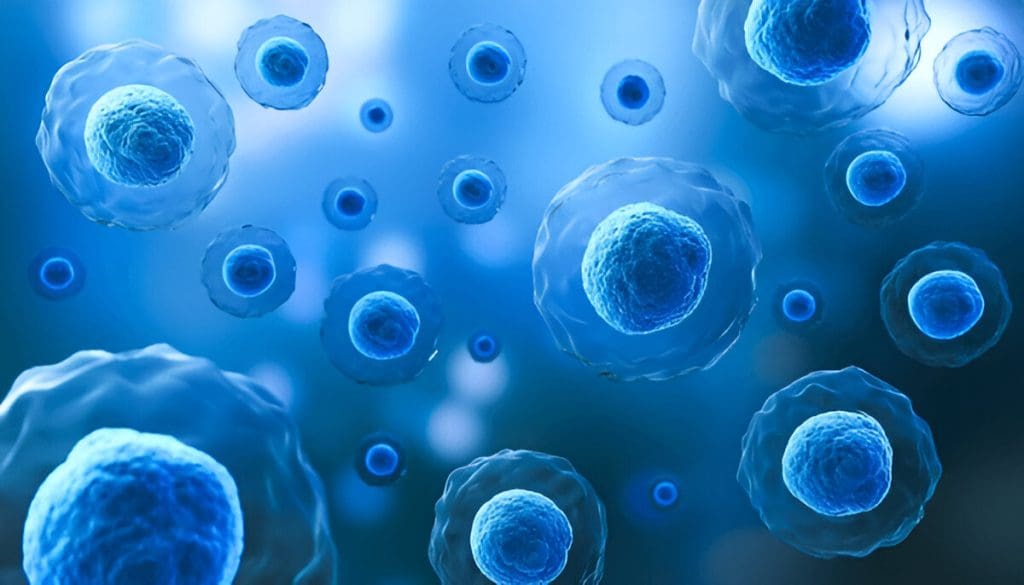
Stem cells are the building blocks of the human body. They play a key role in our health and function. As we get older, we have fewer stem cells. It’s important to know how to help them stay healthy.
Vitamins are crucial for maintaining stem cell health, with some directly aiding their production. Knowing which supplements to increase stem cells is important for our well-being.
Key Takeaways
- Stem cells are fundamental to the human body’s health and function.
- Vitamins play a crucial role in supporting stem cell health.
- Certain vitamins can help support stem cell production.
- Understanding the right vitamins can aid in overall well-being.
- Naturally supporting stem cell health is essential as we age.
The Science of Stem Cells and Cellular Regeneration

Stem cells are key to how our bodies fix and grow tissues. They can turn into different cell types. This helps keep our bodies working well and healthy.
What Are Stem Cells and Why Are They Important?
Stem cells can make copies of themselves and turn into specific cells. They are vital for growth and fixing tissues. They help repair damaged tissues, which is why they’re important for treating diseases and injuries.
Natural Stem Cell Production in the Body
Our bodies naturally make stem cells. This process is affected by what we eat, how much we exercise, and how well we sleep. Some vitamins and nutrients can help our stem cells work better.
| Factor | Influence on Stem Cell Production |
| Diet | Nutrient-dense foods support stem cell health |
| Exercise | Regular physical activity enhances stem cell production |
| Sleep | Adequate sleep is crucial for stem cell regeneration |
Knowing what affects stem cell production helps us support our body’s repair abilities. By choosing the right vitamins and nutrients, we can boost our body’s natural healing powers.
How Vitamins Influence Stem Cell Function
Vitamins play a big role in how stem cells work. They have antioxidant properties and help with epigenetic regulation. Vitamins like C, D, and E protect stem cells from damage. Vitamin B12 is important for energy and helps stem cells function well.
The Cellular Mechanisms Behind Vitamin Action
Vitamins affect stem cells in many ways. They can change signaling pathways that help stem cells grow and change. Vitamin D, for example, helps control genes that make stem cells multiply. They also change the epigenetic landscape of stem cells, which affects their fate and function.
Vitamins are also key for energy in stem cells. Vitamin B12 is needed for ATP, the cell’s energy source. This energy is crucial for stem cell maintenance and differentiation.
The Role of Antioxidants in Protecting Stem Cells
Antioxidants are vital for protecting stem cells from damage. Vitamins C and E are antioxidants that fight free radicals. These vitamins help stem cells survive and function better, keeping cells healthy.
- Vitamin C: Supports collagen synthesis and enhances iron absorption
- Vitamin E: Protects cell membranes from oxidative damage
Epigenetic Effects of Vitamins on Stem Cell Expression
Vitamins also affect stem cells through epigenetic changes. For example, folate (Vitamin B9) is important for DNA methylation. DNA methylation is a key epigenetic modification that affects stem cell function.
The way vitamins influence stem cells shows the complex link between nutrition and cell function. Understanding this can help us see how diet can support stem cell health.
Vitamin D: The Premier Vitamin for Stem Cell Enhancement
Vitamin D is key for stem cell growth and change. It helps keep stem cells healthy, which is important for fixing and growing cells.
Research Evidence on Vitamin D and Stem Cell Proliferation
Many studies have looked at vitamin D’s effect on stem cells. Vitamin D receptors are found in stem cells, showing it directly affects them. Vitamin D helps stem cells grow, aiding in fixing and growing tissues.
“Vitamin D is essential for the regulation of stem cell fate, influencing their ability to differentiate into various cell types.”
Stem Cell Researcher
Optimal Vitamin D Levels for Stem Cell Support
It’s important to keep vitamin D levels right for stem cell health. The best range is often seen as 30-50 ng/mL for overall health, including stem cells.
| Vitamin D Level (ng/mL) | Impact on Stem Cell Health |
| Below 20 | Insufficient; may impair stem cell function |
| 20-29 | Borderline; some impact on stem cell health |
| 30-50 | Optimal; supports healthy stem cell activity |
| Above 50 | Potential for toxicity; monitor levels closely |
Sources of Vitamin D: Sunlight, Diet, and Supplements
Vitamin D comes from sunlight, food, and supplements. Sunlight makes vitamin D in the skin. Foods like fatty fish, egg yolks, and fortified dairy also have vitamin D. Supplements are good for those who can’t get enough from sun or food.
- Sunlight exposure: 10-15 minutes of midday sun several times a week
- Dietary sources: Fatty fish, egg yolks, fortified foods
- Supplements: Vitamin D3 supplements, especially during winter months or for those with deficiency
In summary, vitamin D is vital for stem cell health. It helps them grow and change. By getting enough vitamin D from sunlight, food, and supplements, we can help our cells regenerate and stay healthy.
Vitamin C: Critical Antioxidant for Stem Cell Health
Vitamin C is key for stem cell health. It fights off damage and stress in the body. This helps stem cells work better.
How Vitamin C Supports Stem Cell Function and Differentiation
Vitamin C helps stem cells turn into different types of cells. This is important for fixing and growing tissues. The antioxidant properties of Vitamin C keep stem cells healthy for repair.
Studies show Vitamin C affects how stem cells work. It helps keep cells healthy by changing DNA and proteins. This is good for stem cells to grow and change.
Liposomal vs. Regular Vitamin C for Stem Cell Support
Liposomal Vitamin C is better absorbed than regular Vitamin C. It’s in liposomes, which help it get into cells better. This might help stem cells more.
The enhanced bioavailability of liposomal Vitamin C means better support for stem cells. But, talk to a doctor to see if it’s right for you.
Food Sources and Supplementation Strategies
Eating foods high in Vitamin C is good too. Citrus fruits, strawberries, and leafy greens are great sources.
If you’re thinking about supplements, adding Vitamin C with other antioxidants and nutrients is smart. It’s all about balance and what’s best for you.
B Vitamins: The Metabolic Enhancers for Stem Cells
B vitamins are key for stem cell health. They help with energy, nerve function, and heart health. They also play a big role in how stem cells work and are made.
Vitamin B12 and Folate: Impact on Stem Cell Production
Vitamin B12 and folate are vital for making stem cells. They help with DNA repair and making new DNA. Not having enough can hurt how stem cells work, which can affect our health and how we heal.
“B vitamins and stem cell health are closely linked,” say experts. They stress the need for good nutrition to keep cells working right.
Niacin, B6, and Other B Vitamins’ Effects
Niacin (B3) and B6 are also important for stem cells. Niacin helps with energy, and B6 is key for making neurotransmitters and keeping the immune system strong. Together, they help stem cells grow and change.
- Niacin (B3) supports energy metabolism.
- B6 is involved in neurotransmitter synthesis.
- Folate and B12 are crucial for DNA synthesis.
Optimal B Vitamin Combinations for Stem Cell Support
For the best B vitamin support, mix them right. A B complex supplement ensures you get all B vitamins. Together, they work better to help stem cells function and grow.
When picking supplements, choose ones with a balanced B vitamin mix. This helps your body get the nutrients it needs for stem cell health and overall well-being.
Vitamins E and K: Supporting Actors in Stem Cell Regulation
Vitamins E and K are key players in stem cell health, though often overlooked. They protect stem cells from harm and help them turn into different cell types.
Vitamin E’s Protective Effects on Stem Cell Membranes
Vitamin E is known for its antioxidant powers. It shields stem cell membranes from damage caused by oxidative stress. This is vital because stem cells are very sensitive to their surroundings.
Thanks to vitamin E, stem cells can keep their membranes intact. This lets them work right and turn into the needed cell types. Studies show that taking vitamin E can boost stem cell health and help with cell regeneration.
“Vitamin E’s role in protecting cellular membranes is well-established, and its importance in stem cell health cannot be overstated.” – Stem Cell Researcher
Vitamin K2’s Role in Stem Cell Differentiation
Vitamin K2 is crucial for bone and heart health. It also plays a big part in how stem cells turn into mature cells. It helps control genes that are key for this process.
Research shows vitamin K2 can help stem cells become bone cells. This is good for bone health and regeneration. It also supports heart health, which helps stem cells work better.
Synergistic Effects When Combined With Other Nutrients
Vitamins E and K work better together with other nutrients. For example, adding vitamin C to vitamin E boosts their antioxidant power. This gives stem cells even more protection.
Eating a balanced diet with lots of vitamins and minerals helps stem cells. A healthy lifestyle is also important. Supplements can help if you’re missing out on these nutrients.
| Nutrient | Role in Stem Cell Health | Food Sources |
| Vitamin E | Antioxidant protection for stem cell membranes | Nuts, seeds, vegetable oils |
| Vitamin K2 | Supports stem cell differentiation, bone health | Fermented foods, leafy greens, egg yolks |
Knowing how vitamins E and K help stem cells shows why we need a full plan for cell health. Adding these vitamins to your diet or supplements can improve stem cell function and overall health.
Supplements to Increase Stem Cells: Beyond Basic Vitamins
There are supplements beyond basic vitamins that can boost stem cell health. While vitamins are essential, other supplements can help stem cells work better and grow more.
Polyphenols: Resveratrol, Quercetin, and Curcumin
Polyphenols are known for their antioxidant powers and help with stem cell health. Resveratrol, found in grapes and berries, helps stem cells grow and change. Quercetin, in fruits and veggies, fights inflammation and protects stem cells. Curcumin, from turmeric, boosts stem cell function and fights oxidative stress.
Omega-3 Fatty Acids and Stem Cell Membrane Function
Omega-3 fatty acids, like EPA and DHA, are key for stem cell membrane health. They keep cell membranes working right, helping stem cells grow and change.
| Omega-3 Fatty Acid | Source | Benefit for Stem Cells |
| EPA | Fatty fish, fish oil supplements | Reduces inflammation, supports membrane health |
| DHA | Fatty fish, algal oil supplements | Enhances cell membrane structure and function |
Specialized Pro-resolving Mediators (SPMs)
SPMs, from omega-3s, help fight inflammation and support stem cells. They’re important for fixing tissues and regrowing them.
Adaptogenic Herbs That Support Stem Cell Function
Adaptogenic herbs like Ashwagandha and Ginseng boost energy and resilience. Studies show they might also help stem cells by reducing stress and keeping cells balanced.
- Ashwagandha: May reduce stress and cortisol levels, potentially supporting stem cell health
- Ginseng: May enhance stem cell proliferation and differentiation
Adding these supplements to your routine can help support stem cell health and overall well-being.
Stem Cell Nutrition Supplement Formulations
The field of nutritional science has seen a big leap with stem cell food supplements. As we learn more about stem cells and their health role, interest in these supplements grows. They aim to support stem cell function.
Commercial Products Designed for Stem Cell Support
Many products now aim to boost stem cell health. These stem cell dietary supplements mix vitamins, minerals, and nutrients. They’re thought to improve stem cell function and cell regeneration.
Key ingredients include vitamins D and C, B vitamins, and antioxidants. These nutrients help support stem cell production and upkeep.
Evaluating Quality, Purity, and Manufacturing Standards
Choosing a stem cell food supplement means checking quality, purity, and manufacturing. Look at the manufacturing process and third-party testing. Make sure it’s free from contaminants.
- Look for certifications from trusted organizations.
- Check the label for clear ingredient and quantity information.
- Research the manufacturer’s reputation and history.
Cost-Effectiveness of Different Products
The price of cellular regeneration supplements varies a lot. It depends on the ingredients, brand, and quality. When comparing costs, think about the benefits and scientific backing.
Consider long-term costs and savings. A pricier supplement might be more cost-effective if it’s more effective or needs less frequent use.
Choosing a stem cell supplement should be based on its benefits of stem cell supplements, quality, and fit with your health goals.
Cellular Rejuvenation Supplements: Evidence and Efficacy
Supplements for cellular rejuvenation are getting more attention. They aim to boost stem cell health. As regenerative medicine research grows, knowing how these supplements work is key.
Clinical Research on Stem Cell-Enhancing Supplements
Many studies look into how supplements affect stem cells. Vitamin D helps control stem cell growth and division. Vitamin C protects stem cells from damage caused by free radicals.
Omega-3 fatty acids and curcumin are also studied. Omega-3s make stem cell membranes more fluid. Curcumin’s anti-inflammatory effects help stem cells work better.
Biomarkers for Measuring Supplement Effectiveness
Scientists use biomarkers to see if supplements work. They look at how well stem cells move, grow, and stay healthy. For example, more stem cells in the blood or certain genes being active show a supplement’s success.
They also check for signs of damage and inflammation. Malondialdehyde (MDA) and C-reactive protein (CRP) tell us how a supplement affects cells.
Realistic Expectations from Supplementation
Supplements can help stem cells, but we shouldn’t expect miracles. They’re part of a bigger health plan. This includes eating well, exercising, and sleeping enough.
How well a supplement works depends on many things. Age, health, and other conditions matter. Always talk to a doctor before trying new supplements.
How to Repair Damaged Cells Naturally Through Diet
Eating the right foods can help fix damaged cells in our bodies. Foods full of important nutrients help our stem cells work well. This is key for fixing cells and staying healthy.
Nutrient-Dense Foods That Support Stem Cell Function
Eating foods packed with nutrients is crucial for healthy stem cells. These include:
- Fruits rich in antioxidants, such as berries and citrus fruits
- Leafy greens like spinach and kale, which are high in vitamins and minerals
- Whole grains, which provide fiber and essential B vitamins
- Nuts and seeds, rich in healthy fats and antioxidants
- Fatty fish, which are high in omega-3 fatty acids
These foods give stem cells what they need to stay healthy and function well.
Fasting and Caloric Restriction Effects on Stem Cells
Fasting and caloric restriction can boost stem cell health. These diets can:
- Stimulate stem cell regeneration
- Enhance cellular cleaning processes, such as autophagy
- Improve overall metabolic health
It’s important to start fasting and caloric restriction with a healthcare professional’s advice. This ensures safety and effectiveness.
Anti-Inflammatory Eating Patterns
Chronic inflammation can harm stem cells and slow them down. Eating anti-inflammatory foods can help. Key foods include:
- Foods high in omega-3 fatty acids, such as salmon and sardines
- Turmeric and ginger, which contain anti-inflammatory compounds
- Green tea, rich in antioxidants
- Avoiding processed foods and sugars, which can promote inflammation
By eating these foods, people can support their stem cells. This helps their body fix damaged cells naturally.
Lifestyle Factors That Enhance Stem Cell Production
To boost stem cell production, we need to make lifestyle changes. These changes can help improve our stem cell health and overall well-being.
Exercise and Physical Activity Impacts
Regular exercise is good for stem cell production. Physical activity releases growth factors that help stem cells grow and multiply. For example, exercise can increase stem cells in muscles and bones.
- Aerobic exercises, like running or cycling, improve heart health and boost stem cells.
- Resistance training helps muscles grow and repair by boosting stem cell activity.
- Flexibility and stretching exercises improve movement and lower injury risk.
Sleep Quality and Stem Cell Regeneration
Good sleep is key for health, including stem cell regeneration. Not getting enough sleep can harm stem cells. Quality sleep helps the body repair itself.
- Keep a regular sleep schedule to keep your body’s clock in sync.
- Make your bedroom cool and dark for better sleep.
- Stay away from caffeine and screens before bed.
Stress Management Techniques for Cellular Health
Too much stress can hurt stem cell health. Stress management like meditation, yoga, and deep breathing can help.
“Chronic stress can suppress stem cell activity, making stress management key for healthy stem cells.”
Stem Cell Researcher
By adding these lifestyle changes to our daily lives, we can improve our stem cell production and health.
Creating an Optimal Stem Cell Support Protocol
To make a good stem cell support plan, you need to think about a few things. It’s important to know how to mix supplements well, when to take them, and how to cycle them. This helps keep the benefits going.
Combining Supplements for Synergistic Effects
When you mix stem cell vitamins and other nutrients, they work better together. For example, vitamin D and vitamin K2 together help stem cells grow and change. A good stem cell nutrition supplement plan looks at how different nutrients work together.
| Supplement Combination | Synergistic Effect |
| Vitamin D + Vitamin K2 | Enhanced stem cell proliferation and differentiation |
| Vitamin C + Omega-3 Fatty Acids | Improved antioxidant protection and cell membrane health |
| B Vitamins + Adaptogenic Herbs | Support for energy metabolism and stress resilience |
Timing Considerations for Maximum Absorption
When you take supplements can affect how well they work. For example, taking fat-soluble vitamins like D, E, and K with food that has healthy fats helps them get absorbed better. Also, cell rejuvenation supplements might work best at certain times, like with breakfast or before bed.
Cycling Supplements for Sustained Benefits
To keep supplements working well, cycling them is a good idea. This means taking them for a while, then stopping for a bit. This keeps the benefits going and stops the body from getting used to the supplements too quickly.
In short, making a great stem cell support plan takes some thought. You need to think about how to mix supplements, when to take them, and how to cycle them. By using stem cell vitamins and other cell rejuvenation supplements wisely, you can get the most out of them and help your stem cells stay healthy.
Potential Benefits of Enhanced Stem Cell Activity
Stem cell enhancement offers many health benefits. It can improve overall health and well-being. By supporting stem cells, people can see big improvements in their health.
Anti-Aging and Longevity Effects
Stem cell activity helps fight aging. This could mean living a longer, healthier life. Supplements can help by boosting cell regeneration.
Improved Recovery from Exercise and Injury
Stem cell supplements help heal faster after workouts or injuries. This is great for athletes and those who are always on the move.
Cognitive Function and Neurogenesis
Stem cell activity may also boost brain health. It could improve mental clarity and lower the risk of brain diseases.
Immune System Regulation and Support
Stem cell enhancement strengthens the immune system. This means better health and less chance of getting sick.
| Benefit | Description | Potential Outcome |
| Anti-Aging | Enhanced stem cell activity supports cellular regeneration | Longer, healthier life |
| Improved Recovery | Stem cell supplements aid in faster recovery from exercise and injury | Faster return to activity |
| Cognitive Function | Stem cell enhancement supports neurogenesis and cognitive health | Improved mental clarity and reduced risk of neurodegenerative diseases |
| Immune System Support | Enhanced stem cell activity contributes to immune system regulation | Better immune function and reduced illness susceptibility |
In conclusion, enhanced stem cell activity offers many benefits. These include anti-aging, faster recovery, better brain function, and a stronger immune system. Adding stem cell supplements to your routine could lead to these improvements.
Safety Considerations and Contraindications
It’s important to know the safety of stem cell supplements. They can help with stem cell health but come with risks and interactions. Understanding these is key.
Who Should Exercise Caution with Stem Cell Supplements
Some people should be careful with stem cell supplements. This includes:
- Those with health issues like cancer or autoimmune diseases
- Pregnant or breastfeeding women, as effects on the fetus or baby are unknown
- People on medications that might interact with the supplements
It’s vital for these individuals to talk to their healthcare provider before using these supplements.
Potential Interactions with Medications
Stem cell supplements can affect how medications work. This includes:
- Blood thinners, which might be changed by antioxidants in the supplements
- Immunosuppressants, as some supplements could boost immune function
- Chemotherapy, where interactions could change treatment results or increase side effects
Knowing about these interactions is important for safe use.
When to Consult Healthcare Providers
Talking to healthcare providers before starting stem cell supplements is crucial. They can give advice based on your health and medications. You should consult them in these situations:
- When starting a new supplement regimen
- If you experience any side effects from supplements
- If your health or medication changes
Quality Control and Supplement Selection
The quality of stem cell supplements varies. To ensure quality, focus on:
- Choosing products from trusted manufacturers
- Looking for third-party testing and certification
- Checking label claims to match the product’s actual contents
Being careful in choosing supplements can help avoid risks.
Conclusion
Understanding stem cells and how to support them is key to better health. There are many natural ways and supplements to help. A good plan includes natural methods, supplements, and lifestyle choices.
Vitamins and supplements are important for stem cell health. Vitamins D, C, and B help stem cells work well. Exercise, sleep, and managing stress also boost stem cell health.
Using natural methods and supplements can improve your health. Eating right and fasting are good for stem cells. Exercise and managing stress also help keep stem cells healthy.
By focusing on stem cell health, you can see many benefits. You might recover faster, think clearer, and feel better overall. It’s all about a holistic approach to health.
FAQ
How can I measure the effectiveness of stem cell supplements?
Use biomarkers like inflammation and oxidative stress markers to see if supplements work. But remember, results may vary.
What are the best stem cell nutrition supplements available?
Look for products with vitamins, polyphenols, and other nutrients that support stem cells. But check their quality, purity, and how they’re made.
How can I create an optimal stem cell support protocol?
Use supplements together, think about when to take them for best absorption, and cycle them for ongoing benefits. This makes a good stem cell support plan.
What are the potential benefits of enhanced stem cell activity?
More active stem cells can slow aging, aid in recovery, boost brain function, and strengthen the immune system.
Are there any safety considerations when using stem cell supplements?
Yes, people with health issues or on meds should be careful with stem cell supplements. Always talk to a doctor first.
What lifestyle factors can enhance stem cell production?
Regular exercise, enough sleep, and managing stress help increase stem cells. They improve overall stem cell health.
How can I naturally support stem cell health through diet?
Eat foods rich in nutrients, try fasting, and follow anti-inflammatory diets. These help stem cell health.
Can supplements increase stem cell production?
Yes, some supplements like polyphenols, omega-3s, and SPMs can help stem cells. They may boost stem cell production.
What is the role of vitamin D in stem cell health?
Vitamin D is vital for stem cell growth and change. Having the right amount is crucial for stem cell support.
How do vitamins influence stem cell function?
Vitamins affect stem cells through antioxidants, epigenetics, and energy use. This supports stem cell health and growth.
What are the best vitamins for increasing stem cells?
Vitamins D, C, and B vitamins are key for stem cell health. They help stem cells work, grow, and multiply.











